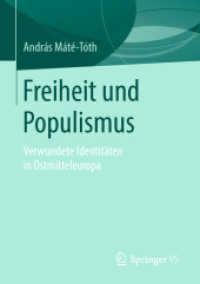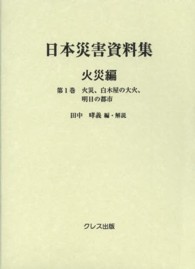Full Description
This volume provides insights into EAP practitioners' identity and agency in varied contexts and field positions.
Each chapter delves into a theoretical perspective (Bourdieu's field theory, Post-humanism, Legitimation Code Theory, Symbolic Interactionism..), and a variety of methodologies, enabling different questions to be explored. Each chapter is also a window into the everyday life of practitioners as they navigate their professional lives, and the specificities of their EAP contexts, the politics and struggles over power, domination, legitimacy, status, ambition and recognition. The authors' concerns and strategies vary and show that the weight of powerful structures and collective habitus is difficult - but not impossible- to resist.
From a socio-analysis of EAP and its narratives of origins, to a discussion on Ethics in EAP and a critique of the Global South label, the reader will explore contributions from Canada, Hong Kong, Malaysia, Pakistan, Singapore, South Africa, the UK, and Zimbabwe.
The chapters reveal a field which is made up of a constellation of worlds, each with its own logic but importantly, a field with no centre. The studies in the chapters are likely to intrigue, inspire, but also disrupt some readers' expectations and challenge their assumptions about the field and its practitioners.
Contents
List of Figures
List of Tables
List of Contributors
Series Editors' Foreword
Acknowledgements
Introduction, Alex Ding (University of Leeds)
Part I: Mesocosms
1. A Socio-Analysis of EAP, Alex Ding (University of Leeds) and Laetitia Monbec(National University of Singapore, Singapore)
2. Collegial Connections and Ethical Entanglements: An Exploration of the Ethics of Scholarship in EAP, Bee Bond (University of Leeds, UK)
3. EAP Practitioners in the Global South: Participation, Positioning and Agency in the Context of 'Peripheral' Scholars and Scholarship, Namala Lakshmi Tilakaratna (National University of Singapore, Singapore)
Part II: Microcosms
4. EAP Practitioners' Identity: From Social Class to Social Capital, Tanzeela Anbreen (University of Bedfordshire, UK) and Samina Ayub(Lahore College for Women University, Pakistan)
5. Trials and Tribulations of EAP Practitioners in Zimbabwe, Tambawoga C. Muchena (Midlands State University, Zimbabwe)
6. 'Be more Pirate': Harnessing the Power of Liminal Spaces in Creating Academic Literacy Practitioner Identity and Agency, Michelle Joubert and Sherran Clarence (University of the Free State, South Africa)
7. Finding Space and Voice: Duoethnographic Exploration of Teacher Agency in EAP, Iwona Winiarska-Pringle (University of Glasgow, UK) and Ania Rolinska (Glasgow School of Art, UK)
8. Respected Teachers or a Marginalized, Stigmatized Profession? An Exploration of UK EAP Practitioner Identity, Sarah Taylor (London School of Economics and Political Science, UK)
9. EAP Teacher Agency in a Digital Age, Blair Matthews (University of St Andrews, UK)
10."Changing Lanes": Balancing between Roles of EAP Lecturer and Researcher in a Teaching Institution towards a Research University, Eric Cheung (College of Professional and Continuing Education, Hong Kong Polytechnic University, Hong Kong)
11. Responding to Students' Disciplinary Writing in a University-wide Writing Requirement: Negotiating Agency through Positioning, Shari Dureshahwar Lughmani (PolyU, Hong Kong) and Svetlana Chigaeva-Heddad (Technological and Higher Education Institute of Hong Kong, Hong Kong)
12. Power and the Canadian EAP Practitioner: Multiethnography as Resistance? James N. Corcoran (York University, Canada), Jennifer J. MacDonald (Dalhousie University, Canada), Jonathan Mendelsohn and Leonardo Gomes
Conclusion: Engaging with Identity and Agency in a Collaborative Project, Laetitia Monbec (National University of Singapore, Singapore)







